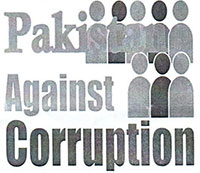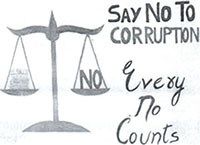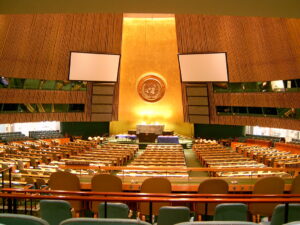Newspaper Article 25/10/2018
Eradication of Corruption in Pakistan – Need of Hour
By C. Andrew
Corruption is not merely financial embezzlement or earning money through bribery or fraud but it means moral deterioration and the use of corrupt practices. Acts which are tantamount to provide undue favor, abuse of public office and patronization also come under corruption. This is deviation of the formal public duties for private gains. As a result of materialistic and opportunist way of life, corruption or corrupt practices become an integral part of those people who are neither apologetic nor ashamed of their corrupt behavior. The problem is in the last four decades or so in Pakistan, the paradigm has changed in terms of rejection and acceptability of corruption. Four decades ago, corruption was considered an evil thing and a practice which was rejected by the large segment of society of Pakistan but now, corruption has not only become a way of life but has obtained some sort of legitimacy as well. Those who are not corrupt are certainly in a minority as compared to those who are engaged in corruption by design and by default. With the erosion of ethics, values and moral traditions, corruption has permeated far and wide in Pakistani society to the extent that it is considered as an ordinary practice and necessity.
It is to mention that corruption is a global phenomenon and one cannot single out a particular community or society to be corrupt but if an objective analysis is made of the existence and influence of corruption, a large number of developing countries or the post-colonial states certainly come under the category of corrupt or highly corrupt countries. And corruption has become a major threat to Pakistani society due to which the image of Pakistan has enormously suffered in the past few decades or so as the corrupt practices were exercised while awarding contracts, launching of foreign funded projects and money laundering done by high level officials who earned a bad name for the country. In 1996, transparency international (TI) a Berlin based civil society organization, rated Pakistan as the second most corrupt country in the world. The report of TI was a source of great shame for Pakistan as it had not only tarnished the country’s image but also discouraged foreign donors to support Pakistan in its developmental projects. When the culture of greed resulting into taking commission from foreign companies and agencies deepened, the trust and confidence of the world on Pakistan and its institutions has diminished. According to TI’s National Corruption Perception (NCP) Survey 2010 there was a widespread corruption in Pakistan from 195 billion rupees in 2009 to 223 billion rupees in 2010. Some of the most corrupt institutions and areas in Pakistan identified by TI are: police, power sector, land administration, communications, education, local government, judiciary, health, taxation, land administration, education and customs.
In Pakistan various efforts were made to eradicate the menace of corruption. National Accountability Bureau (NAB) was formed under National Accountability Ordinance (NAO) 1999 to check the plague of corruption. The NAB is the leading anti-corruption agency of Pakistan. It is charged with the task of eradication of corruption in the country. Initially corruption was eradicated by the means of force only but later on NAB adopted a three pronged strategy for curbing corruption. The cases prepared by NAB are tried by Accountability Courts. It is to mention that soon after taking over in 1999, General Pervaiz Musharraf announced his seven point’s agenda which included the resurgence of the economy, reinstatement of law and order, dispensation of speedy justice and swift and across- the-board accountability. Hence the National Accountability Ordinance (NAO) came into existence. The NAO is the most comprehensive piece of legislation to date in Pakistan for controlling corruption but at the same time it gives NAB Chairman some extraordinary powers such as “order non-bail able arrest of the accused for inquiry and investigation for a maximum of 90 days”; “order freezing of the property of the accused”; “call for information from or examination of any person and the production of any document relevant to the proceedings”; “request a foreign state for all kinds of assistance necessary for investigation” and “release an accused if he returns to NAB the assets acquired through corruption among others”. Under the NAO, if someone is caught for the offence of corruption, he is made punishable with 14 years of rigorous imprisonment. This law is applicable to all the individuals living in Pakistan.
As mentioned earlier, NAB has now also seen more responsible for enhancing awareness related to corruption and for its prevention in addition to its enforcement function. An amendment was made in NAO in 2002 and an attempt was made to develop an anti-corruption preventive model named “National Anti-Corruption Strategy (NACS)”. This model was developed because NAB was of the view that enforcement alone would not be enough to control corruption and hence NACS came into existence. This model focuses on curbing corruption by adopting three pronged approach of awareness, prevention and enforcement. With the passage of time, NACS has started to produce positive results. It has been observed that NAB efforts are strongly disliked by the political entities of certain shades with usual allegations of victimization. It was PPP leadership that resorted to hue and cry on NAB investigations. Now it is the turn of PML (N) which also seems annoyed over investigations/corruption case proceedings against some of its top leaders. In actual, the efforts of NAB are aimed at creating the credibility of the department as an independent investigative entity endeavoring to cleanse the Augean stable of the country from the cancer of corruption. It can be attributed to the efforts of NAB that Pak is improving its Corruption Perception Index (CPI) as reported by the Transparency International. Recent cases of corruption against prominent political as well as bureaucratic figures such as Nawaz Sharif, Asif Zardari and others are examples that Pakistan is all set to eradicate the menace of corruption from its society. Present government of PM Imran Khan is said to be committed to get rid the society of Pakistan of corruption. It is pertinent to mention here that the President of Pakistan in his maiden address to joint session of the Parliament said “the biggest reasons of issues facing Pakistan are corruption and group interests. July 25 elections proved that people are fed up of dishonesty and want a system of governance devoid of corruption.” He urged the political leadership to stand united and make concerted efforts to strengthen the accountability system, counter corruption and address serious economic challenges by enforcing austerity and playing their part in providing social justice, health and education to the masses. “In my view, the concept of Naya Pakistan lies in promoting simplicity, discontinuation of unnecessary protocols and a corruption-free system. We should keep in mind that we are a nation which is under the burden of debt,” he said. “For this, there is a need to strengthen accountability institutions, along with a transparent system, so that they can perform their duties honestly and without any discrimination,” he added.
and an attempt was made to develop an anti-corruption preventive model named “National Anti-Corruption Strategy (NACS)”. This model was developed because NAB was of the view that enforcement alone would not be enough to control corruption and hence NACS came into existence. This model focuses on curbing corruption by adopting three pronged approach of awareness, prevention and enforcement. With the passage of time, NACS has started to produce positive results. It has been observed that NAB efforts are strongly disliked by the political entities of certain shades with usual allegations of victimization. It was PPP leadership that resorted to hue and cry on NAB investigations. Now it is the turn of PML (N) which also seems annoyed over investigations/corruption case proceedings against some of its top leaders. In actual, the efforts of NAB are aimed at creating the credibility of the department as an independent investigative entity endeavoring to cleanse the Augean stable of the country from the cancer of corruption. It can be attributed to the efforts of NAB that Pak is improving its Corruption Perception Index (CPI) as reported by the Transparency International. Recent cases of corruption against prominent political as well as bureaucratic figures such as Nawaz Sharif, Asif Zardari and others are examples that Pakistan is all set to eradicate the menace of corruption from its society. Present government of PM Imran Khan is said to be committed to get rid the society of Pakistan of corruption. It is pertinent to mention here that the President of Pakistan in his maiden address to joint session of the Parliament said “the biggest reasons of issues facing Pakistan are corruption and group interests. July 25 elections proved that people are fed up of dishonesty and want a system of governance devoid of corruption.” He urged the political leadership to stand united and make concerted efforts to strengthen the accountability system, counter corruption and address serious economic challenges by enforcing austerity and playing their part in providing social justice, health and education to the masses. “In my view, the concept of Naya Pakistan lies in promoting simplicity, discontinuation of unnecessary protocols and a corruption-free system. We should keep in mind that we are a nation which is under the burden of debt,” he said. “For this, there is a need to strengthen accountability institutions, along with a transparent system, so that they can perform their duties honestly and without any discrimination,” he added.
In retrospection, it is essential to remember that corruption will not go away simply with a change of government. It’s important that the government comes up with a comprehensive policy which should not only be long term but also address the structural problems which lead to corruption. This will require making the workings of government institutions and policymaking more transparent. However, NAB Pakistan under its current Chairman is making all efforts for eradication of corruption which is commendable.
Disclaimer: Views expressed are of the writer and are not necessarily reflective of IPRI policy.


